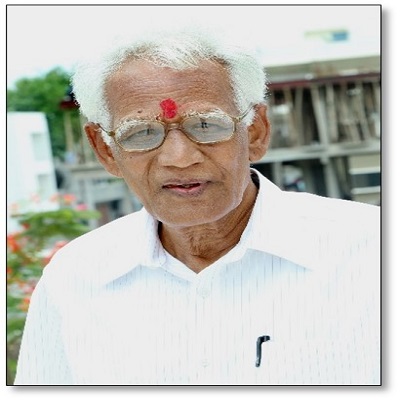
Dr. M.S. Patil
Former Professor and Head, Department of Botany
Shivaji University, Kolhapur, Maharashtra
Professor MS Patil Merit Award
(for Discovery and Documentation of Indian Fungi)
Brief Biodata:
Professor M.S. Patil (Mansaram Sukhdeo Patil) was born on July 15, 1940, in a middle-class family at Ajang (tehsil Malegaon, district Nashik), Maharashtra.
He had completed his primary education (1st to 4th) from Marathi School at Ajang and Vadel New English School, Ravalgaon (5th–8th), and his SSC from Mahatma Gandhi Vidyamandir, Malegaon.
Later, he did his graduation (BSc-Chemistry) from Maharaja Sayajirao Gaikwad Arts Science and Commerce College, Malegaon, in 1965, and post-graduation (MSc-Botany) in 1967 from the University of Poona, Pune.
Professor Patil joined the Botany Department at Poona University in 1968 as a research student to work on the fungi of south-western Maharashtra. Since then, he has been actively engaged in research and completed his PhD degree under
the able guidance of a well-known mycologist, Prof. Dr. S.D. Patil, Department of Botany, Poona University, Poona (Maharashtra). Having keen interests in the systematics of fungi, he started his career in undergraduate teaching (in 1971) at Science College, Karad, and from 1972–2000, postgraduate (PG) teaching as Professor and then Head
Department of Botany, Shivaji University, where he initiated teaching in sericulture, agrochemicals, and pest management, which he continued even after retirement. Overall, Prof. Patil has taught for more than 45 years on Systematics of Ascomycetes (Pyrenomycetes, Loculoascomycetes, Discomycetes), Basidiomycetes (Agaricales, Uredinales, Ustilaginales), Family Geoglossaceae of India, Meliolina of India, Genus Hameleia of India, Entomogenous fungi, VAM fungi,
Powdery mildews, as well as on mycoplasma, etc. Professor Patil is lovingly known among the students and colleagues as the "Living Encyclopedia," as he has vast knowledge of many subjects, from chemistry to history and geography. A good orator, not only in the lecture halls, but equally eloquent in telling stories to young people. A favourite student of his teacher, Prof. Dr. S.D. Patil, he is also the most favorite teacher of all students to date and still enjoys their love and admiration.
Unlike today, he headed his team and department for a long time and created an environment where ideas, instruments, projects, and opportunities were shared harmoniously by students and staff. His interest in gardening is admired by everyone who has visited, tasted the sweet fruits, and smelled the sweet-scented flowers. With a great creative mind and vast vocabulary, he has written hundreds of poems in Marathi. Professor Patil has published >100 research papers on various aspects of mycology and plant pathology, particularly in fungal taxonomy.
During his research endeavour, he described over 100 novel species including recombination and redisposition, and more than a dozen new genera, such as Neolecta, Theumenidium, Thecotheus, Ascodesmis, Coprotus, Theumenidium, Lasiobolus, Aleuria, Pulvinula, Lamprospora, Cryptomyces, Neolecta, Leotia, Microbotryum, Melaniella, Sporisorium, Dasyspora, Malupa, Annulohypoxylon, Rhopalostroma, etc., as well as hundreds of fungal species and varieties reported for the first time from India and Maharashtra. Apart from active teaching, he has handled various longterm research projects, and over 20 students have been awarded Ph.D. and M.Phil. degrees under the supervision of Professor Patil. Post-retirement, he was appointed Visiting Professor at the Department of Botany, University of Poona, Pune. Professor Patil has not only attended numerous conferences, seminars, symposia, etc. in various capacities, but he has also organized conferences, lecture series, and faculty development programs. He has been a member of many administrative and academic bodies and committees at the university. As such, Professor Patil has made his presence marked as a devoted and disciplined teacher, researcher, and guide. His simplicity and sagacity always endeared him to his colleagues, students, and other followers. Coming from a very modest family, he scaled glorious academic heights through sheer hard work, resilience, and devotion. He had research collaborations with many contemporary mycologists all over the world through the exchange of materials, references, scientific opinions, etc., like Dr. I. R. Hall (New Zealand), Prof. Norman C. Schenck (USA), Dr. Jame M. Trappe (USA), Dr. R.W.G. Dennis (UK), Dr. R.F. Cain (Canada), Dr. Vanky (Germany), etc.
Criteria: Study of fungi is always dynamic and rising field, particularly in the taxonomy of fascinating, uncommon, or crucial groups of fungi. Based on multigene phylogeny and conventional phenotypic characterization, newly discovered fungi must be identified and defined. This would enable subsequent generations to continue honoring and appreciating the exceptional educator Prof. MS Patil.
Eligibility:
- Young researchers and teachers with age not exceeding 40 years shall be eligible for this award.
- The candidate completed/pursuing their PhD are also eligible subject to age not exceeding 40 years of age.
- Undergraduate and post graduate students are not eligible.
Terms & Conditions for Award :
- The award will be given by the Association of Fungal Biologists during its annual meet and conference every year
- Award will be given to one best oral and best poster presentations. Awards for oral and poster presentations will be given separately.
- The oral and poster presentations will be delivered during annual meeting and associated symposium/conference of AFB
- ORAL PRESENTATION: Young faculty/Post Doc Fellows (not exceeding 40 years of age) engaged in mycological research/teaching are eligible for this award (First & Second)
- POSTER PRESENTATION: Young faculty/Post Doc Fellows (not exceeding 40 years of age) engaged in mycological research/teaching are eligible for this award (First & Second)
- A committee constituted by the AFB will screen the applicants for the best poster and oral presentation award.
- Preference would be given to quality work on the biphasic taxonomy and systematics of complex / rare/ interesting/ group of micro-macrofungi.
- Each awards will carry a memento and a merit certificate/citation.
- No cash prize will be given
- The decision of constituted committee by AFB will be the final.